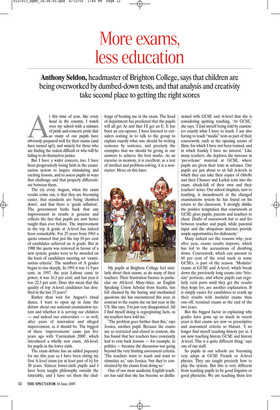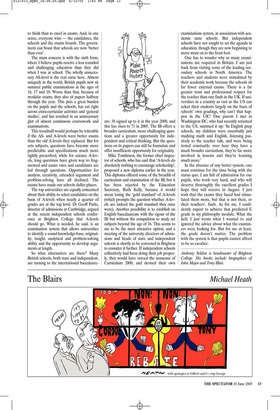More exams, less education
Anthony Seldon, headmaster of Brighton College, says that children are being overworked by dumbed-down tests, and that analysis and creativity take second place to getting the right scores At this time of year, like every head in the country, I watch over my school with a mixture of pride and concern: pride that so many of our pupils have obviously prepared well for their exams (and have turned up!), and anxiety for those who are finding the ordeal difficult or who will be failing to do themselves justice.
But I have a wider concern, too. I have been progressively losing faith in the examination system to inspire stimulating and exciting lessons, and to assess pupils in ways that challenge and that properly differentiate between them.
The cry every August, when the exam results come out, is that they are becoming easier, that standards are being ‘dumbed down’, and that there is ‘grade inflation’. The government barks back that any improvement in results is genuine and reflects the fact that pupils are now better taught than ever before. The improvement in the top A grade at A-level has indeed been remarkable. For 25 years from 1963 a quota ensured that just the top 10 per cent of candidates achieved an A grade. But in 1988 the quota was removed in favour of a new system: grades were to be awarded on the basis of candidates meeting set ‘examination criteria’. The numbers of A grades began to rise sharply. In 1991 it was 11.9 per cent; in 1997, the year Labour came to power, it was 16.3 per cent; and last year it was 22.3 per cent. Does this mean that the quality of top A-level candidates has doubled in the last 15 years?
Rather than wait for August’s ritual dance, I want to open up in June the debate about our national examination system and whether it is serving our children — and indeed our universities — as well, after years of innovation and alleged improvement, as it should be. The biggest of these ‘improvements’ came just five years ago with ‘Curriculum 2000’, which introduced a wholly new exam, AS-level, for pupils in the lower sixth.
The exam debate has an added piquancy for me this year as I have been sitting my first A-level exam (or at least part of it) for 30 years. Sixteen lower-sixth pupils and I have been taught philosophy outside the timetable, and I have set them the chal lenge of beating me in the exam. The head of department has predicted that the pupils will all get As and that I’ll get an E. It has been an eye-opener. I have listened to outsiders coming in to talk to the group to explain exactly what one should be writing sentence by sentence, and precisely the examples that we should be giving in our answers to achieve the best marks. As an exercise in memory, it is excellent; as a test of intellect and problem-solving, it is a nonstarter. More on this later.
My pupils at Brighton College feel similarly about their exams, as do many of their teachers. Their frustration focuses in particular on AS-level. Mary-Alice, an English Speaking Union Scholar from Seattle, has felt cheated by the boring and mechanical questions she has encountered this year, in contrast to the exams she sat last year in the US. She says, ‘I’m just very disappointed. All I find myself doing is regurgitating facts, as my teachers have told me.’ ‘The problem goes further than this,’ says Jessica, another pupil. Because the exams are so restricted and closed in content, she has found that her teachers have constantly had to rein back lessons — for example, in politics — because the discussion was going beyond the very limiting assessment criteria. ‘The teachers want to teach and want to stimulate us,’ says Jessica, ‘but they’re constrained by the exams from doing so.’ One of our most academic English teachers has said that she has become so disillu sioned with GCSE and A-level that she is considering quitting teaching. ‘At GCSE,’ she says, ‘I find myself being told by examiners exactly what I have to teach. I am also having to teach “media” tests as part of their coursework, such as the opening scenes of films, for which I have not been trained, and in which frankly I have no interest.’ Like many teachers, she deplores the increase in ‘pre-release’ material at GCSE, where pupils are given their texts in advance. Our pupils are just about to sit full A-levels in which they can take their copies of Othello and their Chaucer and Larkin texts into the exam, chock-full of their own and their teachers’ notes. Our school chaplain, new to teaching, is incandescent at the changed examinations system he has found on his return to the classroom. ‘I strongly dislike the positive temptation that coursework at GCSE gives pupils, parents and teachers to cheat. Drafts of coursework bat to and fro between teacher and pupil, while parental input and the ubiquitous internet provide ample opportunities for dishonesty.’ Many indeed are the reasons why, year after year, exams results improve, which has led to the accusations of dumbing down. Coursework, which can amount to 60 per cent of the total mark in some GCSEs, is part of the reason. ‘Modular’ exams at GCSE and A-level, which break down the previously long exams into ‘bitesize’ portions, and where pupils can regularly resit parts until they get the results they hope for, are another explanation. It is simply easier for candidates to crank up their results with modular exams than one-off, terminal exams at the end of the two years.
But the biggest factor in explaining why grades have gone up so much in recent years is that exams are now so prescriptive and assessment criteria so blatant. ‘I no longer find myself teaching history per se. I am now teaching history GCSE and history A-level. This is a quite different thing,’ says one of our staff.
So pupils in our schools are becoming very adept at GCSE French or A-level physics. They are taught precisely how to play the system. But this is very different from teaching pupils to be good linguists or good physicists. We are teaching them less to think than to excel in exams. And, in one sense, everyone wins — the candidates, the schools and the exams boards. The government can boast that schools are now ‘better than ever’.
The main concern is with the sixth form, where I believe pupils receive a less rounded and challenging education than they did when I was at school. The wholly unnecessary AS-level is the real curse here. Almost uniquely in the world, British pupils now sit summer public examinations at the ages of 16, 17 and 18. Worse than that, because of modular exams, they also sit papers halfway through the year. This puts a great burden on the pupils and the schools, has cut right across extra-curricular activities and ‘general studies’, and has resulted in an unnecessary glut of almost continuous coursework and examinations.
This treadmill would perhaps be tolerable if the ASand A-levels were better exams than the old A-levels they replaced. But for arts subjects, questions have become more predictable and specifications much more tightly prescribed, while for science A-levels, long questions have given way to fragmented and easier ones and candidates are led through questions. Opportunities for analysis, creativity, extended argument and problem-solving have all declined. The exams have made our schools duller places.
The top universities are equally concerned about their ability to select candidates on the basis of A-levels when nearly a quarter of grades are at the top level. Dr Geoff Parks, director of admissions at Cambridge, argued at the recent independent schools conference at Brighton College that A-levels should go. What is needed, he said, is an examination system that allows universities to identify a sound knowledge-base, originality, insight, analytical and problem-solving ability and the opportunity to develop arguments at length.
So what alternatives are there? Many British schools, both state and independent, are turning to the international baccalaure ate: 38 signed up to it in the year 2000, and this has risen to 71 in 2005. The IB offers a broader curriculum, more challenging questions and a greater opportunity for independent and critical thinking. But the questions on its papers can still be formulaic and offer insufficient opportunity for originality.
Mike Tomlinson, the former chief inspector of schools, who has said that ‘A-levels do absolutely nothing to encourage scholarship’, proposed a new diploma earlier in the year. This diploma offered some of the breadth of curriculum and examination of the IB, but it has been rejected by the Education Secretary, Ruth Kelly, because it would mean losing the ‘gold standard’ of A-levels (which prompts the question whether A-levels are indeed the gold standard they once were). Another possibility is to establish an English baccalaureate with the rigour of the IB but without the compulsion to study set subjects beyond the age of 16. This seems to me to be the most attractive option, and a meeting of the university directors of admissions and heads of state and independent schools is shortly to be convened in Brighton to consider it further. If independent schools collectively had been doing their job properly, they would have vetoed the nonsense of Curriculum 2000, and devised their own examinations system, in association with academic state schools. But independent schools have not sought to set the agenda in education, though they are now beginning to move more on to the front foot.
One has to wonder why so many examinations are required in Britain. I am just back from visiting some of the leading secondary schools in North America. The teachers and students were stimulated by their academic work because the schools sit far fewer external exams. There is a far greater trust and professional respect for the teacher than one finds in the UK. If universities in a country as vast as the US can select their students largely on the basis of schools’ own gradings, why can’t that happen in the UK? One parent I met in Washington DC, who had recently returned to the US, summed it up: ‘In English prep schools, my children were essentially just studying math and English, listening passively to the teacher talk, and were being tested constantly: over here they have a much broader curriculum, they’re far more involved in lessons and they’re learning much more.’ In the absence of any better system, one must continue for the time being with the status quo. I am full of admiration for our pupils, who work very hard, and who will deserve thoroughly the excellent grades I hope they will receive in August. I just wish that the exams they faced had stimulated them more, but that is not their, or their teachers’, fault. As for me, I confidently expect to achieve that predicted E grade in my philosophy module. What the hell; I just wrote what I wanted to and ignored the advice about what the examiners were looking for. But for me at least, the grade doesn’t matter. The problem with the system is that pupils cannot afford to be so cavalier.

















































 Previous page
Previous page